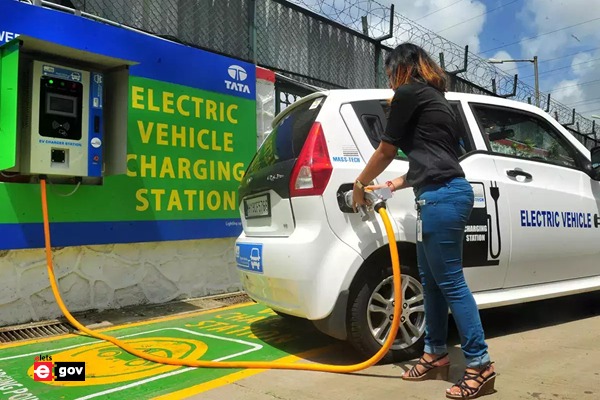
The Delhi government has set a target to install 18,000 electric vehicle (EV) charging points by 2024. The Department of Transport, Delhi government, in its battery swapping and charging infrastructure action plan for 2022-25, has set the target based on EV sales projections for 2024. As per the target, five battery swapping docks will be considered equivalent to a single charging point.
According to the action plan of the Transport Department released at the Delhi EV Forum on Monday, the Delhi EV policy targets that EVs account for 25 per cent of all the new vehicle registrations. This projection is based on the Compound Annual Growth Rate (CAGR) of new vehicle registrations for the period 2014-19, to achieve the target set for 2024, which is also aligned with Delhi government’s EV policy.
Delhi currently has a minimum 2,452 charging points that are spread across 1,919 locations. As per the roadmap, for every 15 EVs, Delhi has set a goal to achieve one public charging point by 2024, spread evenly citywide and accessible within 3 kms distance from anywhere in the city.

Speaking at the Delhi EV Forum, Delhi Transport Minister said, “The most important target is creating a good network of charging stations. Delhi already has more than 2,000 charging stations. Around 100 charging stations are being created. We have a target of making a charging point available in a radius of three kilometers.”
The roadmap states, “The need for public charging varies by segment and use case. Taking into account the EV penetration and public charging needs of different vehicle segments and use cases, a charger to EV ratio of 1:15 translates to around 18,000 charging points that would be required to cater for the need for electric vehicles in the horizon year of 2024.”

The EV action plan aims to develop a unified strategy to deploy EV charging stations (EVCS) and battery swapping facilities (BSF) in Delhi. “It will provide an integrated plan of action for all stakeholder agencies to maintain synergy in deploying EV charging/battery swapping facilities in the NCT of Delhi.“
Also Read | Government working to bring an EV one-stop super app for all key information
Furthermore, the charging or swapping use cases will be identified primarily based on charging requirements for various market segments viz., delivery service providers, fleet owners for passenger and freight, passenger vehicles, and public transport vehicles.
According to the action plan, 20 per cent of parking area in new buildings and five per cent of all current parking areas below the purview of various businesses must be readied for EVs with no less than 3.3 Kilowatt (kW) output charging points.
A wide range of stakeholders will also be allowed with those including advanced chemistry battery manufacturers, battery swapping operators, charge point operators, delivery service providers, fleet owners as well as power distribution companies to take part in the location-allocation process for setting up EV charging and swapping stations.
The EV policy was notified by Delhi government on August 7, 2020 and the state transport department was appointed as the nodal agency for policy implementation. According to the report, since the launch of the policy, Delhi has made significant strides in EV adoption.
It said, “There has since been a steady uptake in the deployment of EV charging and swapping infrastructure in the NCT of Delhi. This steady uptake has been made possible by rigorous implementation of the mandates in the Delhi EV policy.”
As per the action plan, there are as many as 13 clauses pertaining to EV charging infrastructure in the Delhi EV policy, ten clauses out of these have been completely operationalised, while two have been partially operationalised, and one clause remains to be operationalised.
Also Read | Delhi Govt to partner with EESL for installing EV charging infrastructure
The Delhi government has so far achieved about 83 per cent of the targets and commitments made in the EV policy, informed Jasmine Shah, Vice Chairperson, Dialogue and Development Commission.
Sharing his views, Shah said, “I think one area we need to do a lot more is EV battery recycling. We do have a vision for that under the EV policy but I think it has not been as straightforward in terms of putting in the implementation. This is a challenge that as a country we are grappling with. We don’t have any stringent regulations on that front (battery recycling).”
He further emphasised the need to proliferate EV adoption in segments like passenger auto rickshaws. In 2021, Delhi government came up with 4,200 EV licenses, educated the auto drivers as well as offered them financial assistance.
Be a part of Elets Collaborative Initiatives. Join Us for Upcoming Events and explore business opportunities. Like us on Facebook , connect with us on LinkedIn and follow us on Twitter, Instagram.











